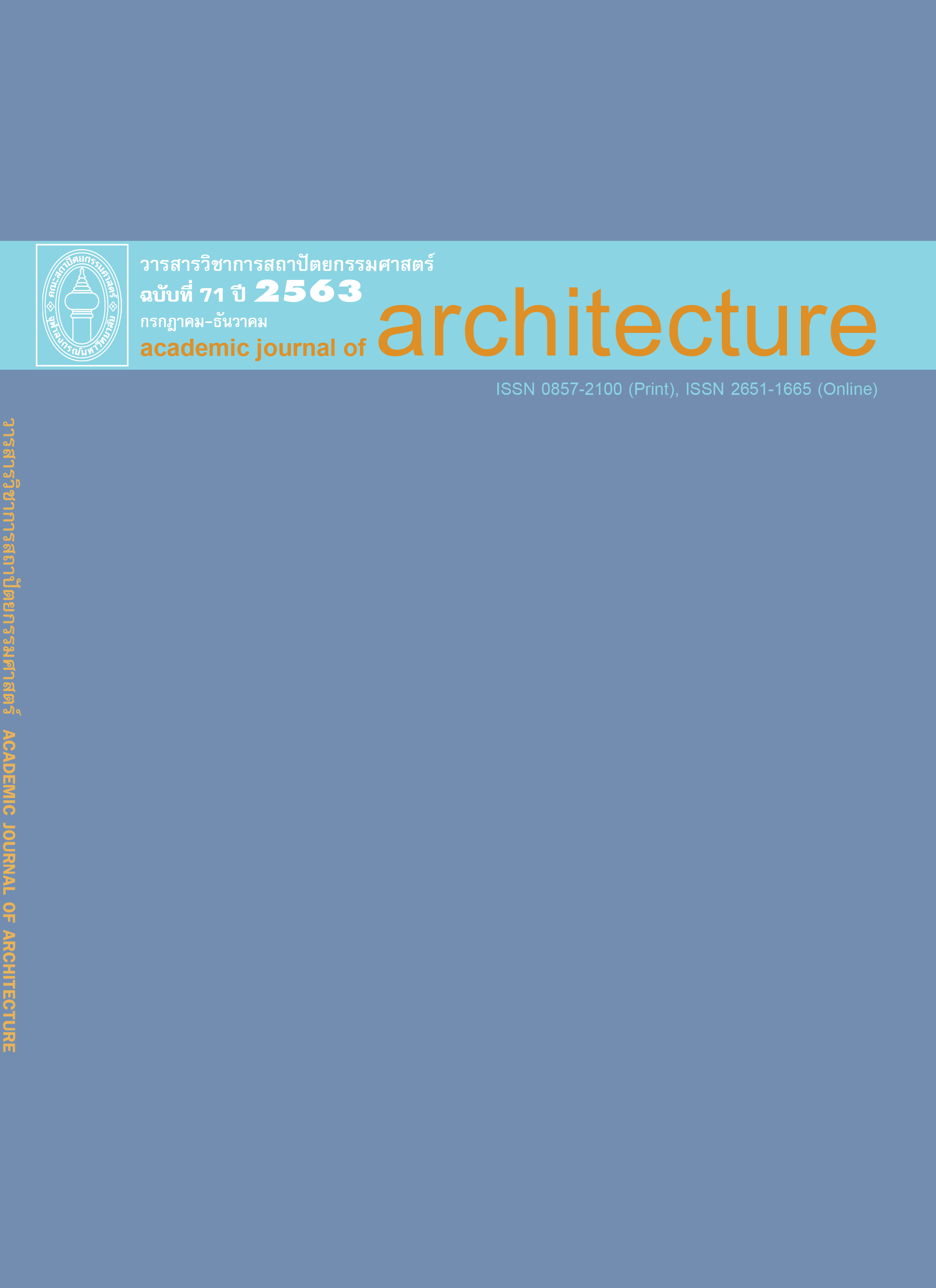Thai Government’s Real Estate Measure after The Economic Crisis, 1997-2019
Main Article Content
Abstract
This research aims to explore the characteristics of real estate measures issued by the Thai government after the economic crisis, from 1997-2019. Data was collected from the BOT, REIC and other related sources. Data analysis was conducted through data coding and re-coding, diagramming the relationship of measurements and economic indicators. There are three major findings: Firstly, there were 7 measures divided into three types: (1) measures for stimulating housing demand; (2) measures for supporting housing for low-income groups; and (3) measures of regulations and setting up real estate agencies. Secondly, the most-issued measures aimed at stimulating housing demand included tax measure, financial measure and reducing ownership transfer fee. Lastly, the number of real estate measures issued had a direct correlation with contemporary political and economic conditions. The measures could thus be grouped into 3 periods: (1) 1997-2003, or the Thai economic crisis period; (2) 2004-2012, or the period of economic recession and recovery; and (3) 2013-2018, or the period of economic recession. These periods shared the same economic conditions in terms of recession and moving upwards. The research results contribute to public and private sectors understanding those measures and apply for real estate planning or solving problems when the socio-economic change in the future.
Article Details
References
ดลพิวัฒน์ ปรีดาวิภาต, ธีรวุฒิ บุณยโสภณ, กำพล รุจิวิชชญ์ และ ไชยา ยิ้มวิไล. (2555). การพัฒนารูปแบบการบริหารจัดการธุรกิจอสังหาริมทรัพย์ในภาวะเศรษฐกิจถดถอย. วารสารวิชาการพระจอมเกล้าพระนครเหนือ, 22(2), 416-426.
ธนาคารแห่งประเทศไทย. (2562). เครื่องชี้ธุรกิจอสังหาริมทรัพย์. สืบค้นเมื่อ 19 กรกฎาคม 2562, จาก https://www.bot.or.th/App/BTWS_STAT/statistics/BOTWEBSTAT.aspx?reportID=899&language=TH
ธนาคารอาคารสงเคราะห์. (2540). มาตรการฟื้นฟูธุรกิจอสังหาริมทรัพย์. วารสารธนาคารอาคารสงเคราะห์, 3(8), 39-42.
บริษัท Knight Frank ประเทศไทย จำกัด. [ม.ป.ป.]. Bangkok condominium supply 2009-2H2017. สืบค้นเมื่อ 1 กรกฎาคม 2563, จาก https://thailandproperty-news.knightfrank.co.th
ประพันธ์ เศวตนันทน์ และ ไพศาล เล็กอุทัย. (2544). หลักเศรษฐศาสตร์ (พิมพ์ครั้งที่ 7). กรุงเทพฯ: คณะเศรษฐศาสตร์ จุฬาลงกรณ์มหาวิทยาลัย.
เปี่ยมจันทร์ ดวงมณี. (2562). The linkages between property and commercial banking sectors: Impact on Thai economy. สืบค้นเมื่อ 12 ธันวาคม 2562, จาก https://www.bot.or.th/Thai/Segmentation/Student/setthatat/DocLib_ Settha_ME_2554/M_Present_Solace2_2554.pdf
พรทิพย์ ษมาวัตร. (2541, สิงหาคม). พัฒนาการธุรกิจอสังหาริมทรัพย์ไทย. รายงานเศรษฐกิจรายเดือน, 38(8), 11-34.
พัลลภ กฤตยานวัช. (2547). ภาพรวมของธุรกิจอสังหาริมทรัพย์. กรุงเทพฯ: ศูนย์อสังหาริมทรัพย์.
ศิริพร นพรัตน์นภาลัย. (2547). การปรับตัวตามวัฎจักรของผู้ประกอบการธุรกิจบ้านเดี่ยวและทาวน์เฮ้าส์ในกรุงเทพมหานครและปริมณฑล. (วิทยานิพนธ์ปริญญามหาบัณฑิต, มหาวิทยาลัยธรรมศาสตร์).
สถาบันวิจัยเพื่อการพัฒนาประเทศไทย. (2547). โครงการศึกษาผลกระทบการพัฒนาที่อยู่อาศัย. กรุงเทพฯ: [ม.ป.ท.].
สำนักงานเศรษฐกิจการคลัง. (2563). เศรษฐศาสตร์น่ารู้: นโยบายการคลัง. สืบค้นเมื่อ 31 กรกฎาคม 2563, จาก http://www2.fpo.go.th/S-I/Source/ECO/ECO10.htm
เอื้อมพร หลินเจริญ. (2554). เทคนิคการวิเคราะห์ข้อมูลเชิงคุณภาพ. วารสารการวัดผลการศึกษา มหาวิทยาลัยมหาสารคาม, 17(1), 17-29.
Huyck, Alfred Van. (1987). New directions for national shelter policies: Shelter; settlement & development. New South Wales: Allen & Unwin.
Muller, Anders Almy Richard & Engelschalk Michael. (2009). Real estate bubbles and the economic crises: The role of credit standards and the impact of tax policy. Journal of Property Tax Assessment, 7(1), 13-36.
Renaud, Bertrand Zhang Ming & Koeberle Stefan. (2001). Real estate and the Asian crisis: Lessons of the Thailand Experience. In: Brown S.J., Liu C.H. (eds.) A global perspective on real estate cycles. (p.49). Boston: Springer.
Geltner, David M. Miller Norman G., Clayton Jim & Eichholtz Piet. (2007). Commercial real estate: Analysis & investments. Mason, OH: Thomson South-Western.
Miles, Mike E. Gayle L. Berens, Mark J. Eppli & Weiss Marc A. (2007). Real estate development: Principles and process. Washington, DC: Urban Land Institute.
Miller, Norman Liang Peng & Sklarz Michael. (2011). House prices and economic growth. Journal of Real Estate Finance and Economics, 42, 522–541.
Hall, Peter & Pfeiffer Ulrich. (2000). Urban future 21: A global agenda for twenty-first century cities. New York: E & FN Spon.
Silverman, Robert Mark & Patterson L.Kelly. (2015). Qualitative research methods for community development. New York, NY: Routledge.
World Bank. (1975). Housing: Sector policy. Geneva: World Bank.


